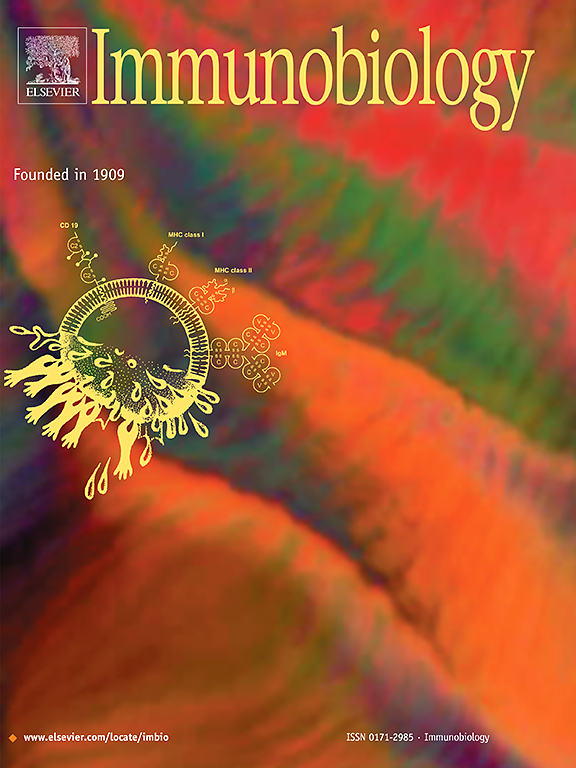下调骨髓间充质干细胞中的 LKB1 可通过 PD-1/PD-L1 信号通路抑制 CD4+ T 细胞增殖。
IF 2.3
4区 医学
Q3 IMMUNOLOGY
引用次数: 0
摘要
背景:我们之前的研究表明,羊膜间充质干细胞(MSCs)中的LKB1是调节T细胞分化和T细胞增殖的重要调节因子,它在骨髓间充质干细胞(BMMSCs)中可能也有类似的作用。因此,我们研究了LKB1在骨髓间充质干细胞中调节AML骨微环境中CD4+ T细胞增殖的作用:方法:采用 RT-PCR 技术评估 LKB1 在 AML 患者和健康对照组 BMMSCs 中的表达。随后,在 BMMSCs 株系 HS-5 中敲除 LKB1(HS-5-LKB1KD)。体外共培养分析了HS-5-LKB1KD对CD4+ T细胞的影响。采用流式细胞术测量 PD-L1 和 CD4+ T 细胞增殖水平。Western blot用于检测相关蛋白:结果:来自 AML 患者的 BMMSCs 中 LKB1 表达减少。在 HS-5 中敲除 LKB1 会导致 PD-L1 表达上调。与HS-5-LKB1KD共培养外周血CD4+ T细胞相比,与HS-5-LKB1con共培养的CD4+ T细胞增殖减少。此外,在共培养条件下阻断 PD-L1 可以恢复降低的 CD4+ T 细胞增殖。此外,研究还发现,在敲除 HS-5 中的 LKB1 后,Wnt 信号通路相关蛋白上调,这表明下调 LKB1 可通过激活 Wnt 信号通路促进 PD-L1 的表达:结论:LKB1在BMMSCs中的表达减少可能会激活Wnt信号通路,导致PD-L1表达增加。结论:BMMSCs 中 LKB1 表达的减少可能会激活 Wnt 信号通路,导致 PD-L1 表达增加,从而抑制 CD4+ T 细胞的增殖,这可能会导致 AML 患者的抗肿瘤免疫功能受损,并促进 AML 的进展。本文章由计算机程序翻译,如有差异,请以英文原文为准。
Downregulating LKB1 in bone marrow mesenchymal stem cells could inhibit CD4+ T cell proliferation via the PD-1/PD-L1 signaling pathway
Background
Our previous research has shown that LKB1 in amniotic mesenchymal stem cells (MSCs) serves as a vital regulator of regulatory T cell differentiation and T cell proliferation, which may have a similar role in bone marrow MSCs (BMMSCs). Therefore, we investigated the role of LKB1 in BMMSCs for regulating CD4+ T cell proliferation in the bone micro-environment of AML.
Methods
RT-PCR was used to assessed LKB1 expression in BMMSCs derived from AML patients and healthy controls. Subsequently, LKB1 was knocked down in the BMMSCs line HS-5 (HS-5-LKB1KD). Co-cultures in vitro were established to analyze the effect of HS-5-LKB1KD on CD4+ T cell. Flow cytometry was employed to measure PD-L1 and CD4+ T cell proliferation levels. Western blot was utilized to detect related proteins.
Results
The expression of LKB1 in BMMSCs derived from AML patients was decreased. Knockdown of LKB1 in HS-5 resulted in upregulation of PD-L1 expression. Co-culture of peripheral blood CD4+ T cell with HS-5-LKB1KD exhibited reduced CD4+ T cell proliferation compared to co-culture with HS-5-LKB1con. Furthermore, blocking PD-L1 in the co-culture conditions could restore the reduced CD4+ T cell proliferation. Additionally, it was found that upregulation of the Wnt signaling pathway-related proteins following LKB1 knockdown in HS-5, indicating that downregulating LKB1 could promote PD-L1 expression through activation of the Wnt signaling pathway.
Conclusions
The decreased expression of LKB1 in BMMSCs may activate the Wnt signaling pathway, leading to increased PD-L1 expression. This inhibited CD4+ T cell proliferation, which might lead to impaired anti-tumor immunity in AML patients and promote AML progression.
求助全文
通过发布文献求助,成功后即可免费获取论文全文。
去求助
来源期刊

Immunobiology
医学-免疫学
CiteScore
5.00
自引率
3.60%
发文量
108
审稿时长
55 days
期刊介绍:
Immunobiology is a peer-reviewed journal that publishes highly innovative research approaches for a wide range of immunological subjects, including
• Innate Immunity,
• Adaptive Immunity,
• Complement Biology,
• Macrophage and Dendritic Cell Biology,
• Parasite Immunology,
• Tumour Immunology,
• Clinical Immunology,
• Immunogenetics,
• Immunotherapy and
• Immunopathology of infectious, allergic and autoimmune disease.
 求助内容:
求助内容: 应助结果提醒方式:
应助结果提醒方式:


